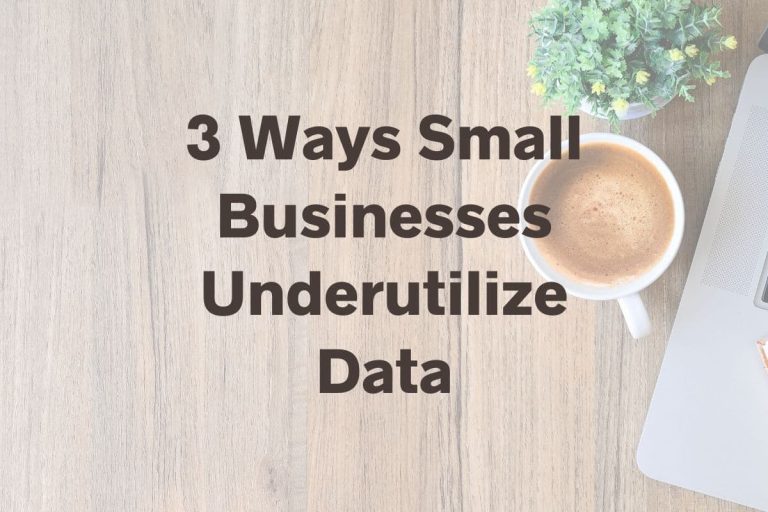5 Ways Data Analytics Helps Businesses
Whether your business is large or small, you really need to understand the importance of data analytics to drive growth, recognize opportunities, find efficiencies, and so much more! Data analytics, simply put, is the process of analyzing data to conclude, support a decision, or provide a recommendation.
Having data on hand is critical for business owners to optimize so much of their business!
Understanding Data Analytics
Imagine setting business goals such as a 50% sales increase in the next two months without having to look at the data on hand. While this is a simplistic example since we are talking sales, not having based that sales goal on some sort of historical data is like driving your car blindfolded. With data analytics, you can see the stop signs, roads with heavy traffic, alternative routes to your destination, and even the expected time of arrival. The same goes for your business, data analytics presents you with raw information which could include the demographics of your customers, their buying behavior, purchasing power, and how to target them.
It is not enough that you have the data. What is more important is which data should be used and how these should be used to come up with a data-driven decision for your next steps. The value of the information on hand is when they are analyzed to formulate insights towards revenue growth, increase market share, or production efficiency.
Let’s dive into how data analytics could help your business thrive.
1. View Into What is Working & What is Not
With data analytics, business leaders at all levels are empowered to determine which strategies are working and which are not.
For example, let’s assume you have a small bakery, and you are running a Facebook campaign to increase brand awareness. You would like to expand your reach.
Using business analytics, you can gain valuable insights by looking into the data of Facebook Analytics or Facebook Business Suite. You can identify whether your campaign appeals more to men than women, their age bracket, and locations.
With this in mind, you can make adjustments such as updating your caption or change the colors of your visuals.
You have a more informed view for business decisions by using data. Speaking of…
2. Improved Decision Making
If you have the data and you can see the patterns within the data, coming up with a decision is faster. It also provides you more confidence with your decision-making because you have something to support your claim.
Data analytics enables you and your team to make decisions faster and with greater accuracy.
Let’s say that you are running two marketing campaigns simultaneously across two different social media platforms – one on Facebook and the other on Instagram. Upon going through the data set, the engagement rate on the new product line is higher on Instagram but the conversion is low. This means that although a lot of people are interacting with your campaign only a few are influenced to make the purchase.
On the other hand, let’s say that your Facebook data shows that the customer engagement is high and the conversion rate is also high. This means that your audience on Facebook is interacting with your campaign and that these interactions are converted into sales.
With this kind of customer behavior information, you can make a decision right away on whether you should bump up your advertising spend on Facebook or not. Speaking of..
3. Prompt Responses to Changes in the Business Environment
The beauty of data analytics is that there are stories within this dataset which you need to uncover. Once you can see the clues you can now make changes in your campaign in real-time. Business owners can save money from spending budgets on campaigns with low return on investments (ROI). In addition, it saves you time on running low-performing campaigns and you can make use of your time in other areas of the business.
Sticking with our data savvy bakery, let’s say that their brand awareness campaign is just not picking up. You can use the dashboards within Facebook to make adjustments right away.
If you are running a search engine optimization campaign and ranking does not improve after a week, you can make alterations in real-time based on your data analysis.
Have your customer demands changed? Sometimes you will get wind through anecdotal comments, but data can help you find them sooner.
Even if your data analytics isn’t able to get to that level of information yet, your analytics tools could help you quantify the impact at a minimum.
That helps respond appropriately and understand the future outcomes based on the responses at your disposal to handle the situation. Actionable insights is the name of the game here!

4. Increases Competitive Advantage
Data analysis gives you competitive leverage in your industry by being able to have a better understanding of your product and can help drive product development.
It also allows you to forecast your product demand based on current market conditions and customer trends.
Understanding your data also allows you to create a better process between different departments of your organization.
Going back to the local bakery shop as an example, upon analyzing your data, you have identified three major setbacks with your delivery service. 20% of the deliveries were delayed, 10% percent of the delivered items were wrong orders, 5% had no delivery receipt given. With all of this information, you can create strategies on how to address these issues.
This insight could equate to touching the following in your business:
1. better customer satisfaction
2. improved turnaround by reducing delays and wrong orders
Both outcomes impact customer retention and efficiency which ultimately impacts the bottom line.
With efficiency and optimization a target throughout your operation, these improvements translate to potential market share increases and perhaps an edge against competitors, as well
5. Targeted Efforts
Your data analysis tells you what kind of content is best used for a specific audience. Sometimes you blend your data with more macro, external data, as well, but you can build business models to help get your message to those that are more receptive and build products that they want.
Your marketing campaigns should be data-driven and customer-centered. Data analysis enables you to optimize well-performing campaigns.
Knowing who to target and how to convince them increases the probability of sales revenue and lower cost.
Having reliable data, you can also personalize your marketing efforts. If you are doing email marketing, you can personalize the content of your email making it more engaging and impactful as compared to the general content sent out to your customer base.
Analyzing data, especially large set data, requires problem-solving skills and critical thinking. You should be able to determine which data is helpful and which ones should be set aside. You should also be able to understand the connections between the data on hand and how these can address the challenges the company is facing. Dealing with complex data also requires you to be organized and detail-oriented. Analyzing data requires you to have the right tool and these skills to maximize business growth.

